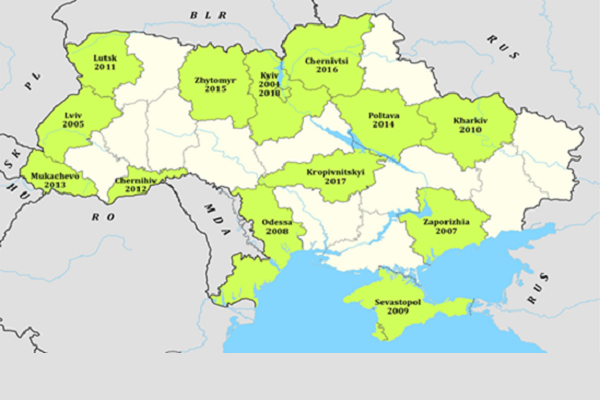J-Project was founded in 2004 by the initiative of Professor of Debrecen University Laszlo Marodi (Hungary) as a scientific and educational project devoted to the dissemination of knowledge among the medical community about primary immunodeficiencies in Central and Eastern European countries. Department of Pediatric Infectious Diseases and Pediatric Immunology joined J-Project since its foundation in the clinical and scientific field of primary immunodeficiencies.

Primary immunodeficiency diseases have long been neglected as medical conditions, but are now recognized as a worldwide health problem. The number of known PIDs now exceeds 400, and more than 250 PID-causing genes have been described. Much has been done in Eastern and Central Europe (ECE), under the auspices of the J PROJECT program, which aims to raise awareness about primary immunodeficiency disorders (PIDs) and to improve medical training in this domain.
The number of countries entering the J Project has steadily been increased and the Project now covers the whole area of ECE. For many years, Ukraine has been one of the most consistent countries in the J project due to active work of Department of Pediatric Infectious Diseases and Immunology. Hundreds of clinicians, who were trained by Department in pediatric immunology, are involved every year in the J Project area. In 2019, 15 years have passed since starting J Project in Eastern Europe and in Ukraine. 15 J Project Meeting were organized by our Department in different regions of the country.
The partnership with national professional societies has also been established in many JP countries. Most of the active JP members are those who are also members of PID working groups of such societies and organize JP meetings as part of the annual events of the national societies. Ukraine was one of the first countries which support the J Project initiative. Annually J Project educational meetings are held in Ukraine in different cities and regions.
Today J Project unites 30 countries from Eastern and Central Europe, Asia and Africa.
15 years of success of J Project were crowned by high level of scientific reports at the 3rd Congress which was held in December 2019 in Konya, Turkey.
The J Project is based on the vision that Eastern and Western Europe should be an undivided continent in terms of PID patient care. The project has achieved remarkable successes over the past 15 years. However, important obstacles, e.g., inattention to PID patients in a number of J Project countries and J Daughter Countries, late diagnosis and lack of adequate treatment like immunoglobulin replacement therapy, PID newborn screening, and hematopoietic stem cell transplantation are still existing. It seems thus that the J Project should further search for complex programs until “all PID patients receive personalized immunoglobulin replacement and hematopoietic stem cell transplantation and it should not be restricted by funding or infrastructure constraints” as it stands in the 2014 Antalya Declaration. Such programs should incorporate awareness, physician education, and improved genetic diagnostics of inborn errors of immunity.
The following five goals are targeted in the field of Primary Immunodeficiencies by our Department in Ukraine:
EDUCATION of healthcare professionals, with the inclusion in the curriculum of PID diseases as a emerging and increasingly important field of clinical medicine. Continuing medical education is also organized for physicians practicing in primary care settings and hospitals. PUBLIC AWARENESS was raised to publicize the fact that most PID patients remain undiagnosed and untreated. PID GENETIC DIAGNOSTICS was managed with collaboration of the other J PROJECT countries. A PID REGISTER is developed, data for all PID patients are entered into national databases. PERSONALIZED IMMUNOGLOBULIN REPLACEMENT is available to most PID patients.
More information is published in Journal of Clinical Immunology (2019) 39:363–369 https://doi.org/10.1007/s10875-019-00633-4 (László Maródi and the J Project study group. Fifteen Years of the J Project).



